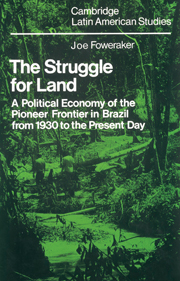 The Struggle for Land
The Struggle for Land Published online by Cambridge University Press: 29 October 2009
The situation of dual authority in the frontier regions, where ownership of land may change not only by commercial contract but by the decisions of the courts leads inevitably to legal confusion at the local level. In the states of the south the Federal State leases land where the local state titles it; these leases, and even simple applications for title – which have no legal validity whatsoever – are negotiated as if they were titles (Gomes 1969). More recently in the states of the north virtually any document issued by the Federal land agency (including tax receipts and farm surveys) are sold in the emerging market for land. Moreover, the body of law governing access to and occupation of land is hugely complex, and the innumerable laws, decree-laws, regulations, instructions, injunctions and ‘explanations’ have never been collated. It is said that in Brazil there are in force some 120,000 laws (Stefannini 1977), and the only one missing is the obligation to obey them.
Quite apart from these legal complexities both Federal and local administrations have proved incapable of controlling the process of occupation of the land. Local land offices were not even equipped with maps of their respective regions, so that title-holders could claim land where it suited them, or extend the boundaries of their claim at will.
To save this book to your Kindle, first ensure [email protected] is added to your Approved Personal Document E-mail List under your Personal Document Settings on the Manage Your Content and Devices page of your Amazon account. Then enter the ‘name’ part of your Kindle email address below. Find out more about saving to your Kindle.
Note you can select to save to either the @free.kindle.com or @kindle.com variations. ‘@free.kindle.com’ emails are free but can only be saved to your device when it is connected to wi-fi. ‘@kindle.com’ emails can be delivered even when you are not connected to wi-fi, but note that service fees apply.
Find out more about the Kindle Personal Document Service.
To save content items to your account, please confirm that you agree to abide by our usage policies. If this is the first time you use this feature, you will be asked to authorise Cambridge Core to connect with your account. Find out more about saving content to Dropbox.
To save content items to your account, please confirm that you agree to abide by our usage policies. If this is the first time you use this feature, you will be asked to authorise Cambridge Core to connect with your account. Find out more about saving content to Google Drive.